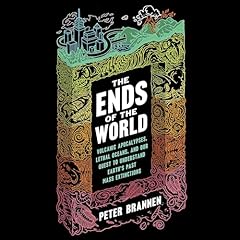
The Silurian Period
The History of the Prehistoric Era When Life Formed on Land
No se pudo agregar al carrito
Add to Cart failed.
Error al Agregar a Lista de Deseos.
Error al eliminar de la lista de deseos.
Error al añadir a tu biblioteca
Error al seguir el podcast
Error al dejar de seguir el podcast
 Exclusivo para miembros Prime: ¿Nuevo en Audible? Obtén 2 audiolibros gratis con tu prueba.
Exclusivo para miembros Prime: ¿Nuevo en Audible? Obtén 2 audiolibros gratis con tu prueba.Compra ahora por $11.18
-
Narrado por:
-
Jim D. Johnston
The early history of Earth covers such vast stretches of time that years, centuries, and even millennia become virtually meaningless. Instead, paleontologists and scientists who study geochronology divide time into periods and eras.
The current view of science is that Earth is around 4.6 billion years old, and the first 4 billion years of its development are known as the Precambrian period. For the first billion years or so, there was no life in Earth, and then the first single-celled life-forms, early bacteria and algae, began to emerge. It’s unclear where they came from or even if they originated on this planet at all, but this gradual development continued until around 4 billion years ago when suddenly (in geological terms) more complex forms of life began to emerge.
Although new species in the Cambrian explosion developed almost entirely in the oceans, the land was not entirely devoid of life. Though there were no plants or animals, mats of cyanobacteria and other types of microbes covered large terrestrial areas. Scientists have discovered the tracks of a creature that were left in mud that existed 551 Mya, and those tracks were left by leg-like appendages. Was this a fish-like creature that temporarily invaded the land, or was it something completely different than anything that exists today? There is no general consensus, but the Cambrian Period left a rich fossil record that provides a clear idea of the development of life during this time. At the same time, new discoveries are continually being made, and the more scientists discover about this mysterious period, the more their understanding of ancient Earth changes.
The Silurian Age occurred during the mid-Paleozoic, and despite its relative brevity, the era developed some interesting features that promulgated life on Earth. Roderick J. Murchison, a British geologist, named a sequence of rocks after a group of indigenous people called the Silures living in Wales during the mid-19th century. Despite their absence in the Silurian Age, the name was bestowed to honor the tribe.
Murchison was inspired by close friend Adam Sedgwick, who named the Cambrian Age, employing the Latin word for Wales. In 1835, the two presented a paper together entitled On the Silurian and Cambrian Systems. Their separate categorizing systems caused a serious enough disagreement over chronology that the friendship ended bitterly. The alternative name for Siluria was Gotlandia after the Baltica island of Gotland.
What ultimately precipitated these subdivisions in the chronology was a “famous unconformity” on the River Onny in Shropshire. It indicated a natural break within “classic Silurian on its own home territory.” The timeline for beginning and end dates has remained imprecise, but the order of fossilized discoveries has proven correct. Joachim Barrande, a French paleontologist, geologist, and botanist, pursued the same issue in the Prague Basin of Bohemia. Studying the Paleozoic trilobite for a period of 10 years, his extensive work was published in his Silurian System of Central Bohemia. Altogether, he identified and analyzed over 4,000 new fossil species, producing the enormous Encyclopedia of Fossils, numbering over 6,000 pages.
Los oyentes también disfrutaron:




















I’ve listened to almost half the Rivers series, and just doesn’t get any better. May be a little hard for casual listening, as it’s monotone, but if you have even a mild interest, you’ll be doing yourself a favor.
Great history lessons.
The Facts Based Data and History
Se ha producido un error. Vuelve a intentarlo dentro de unos minutos.


